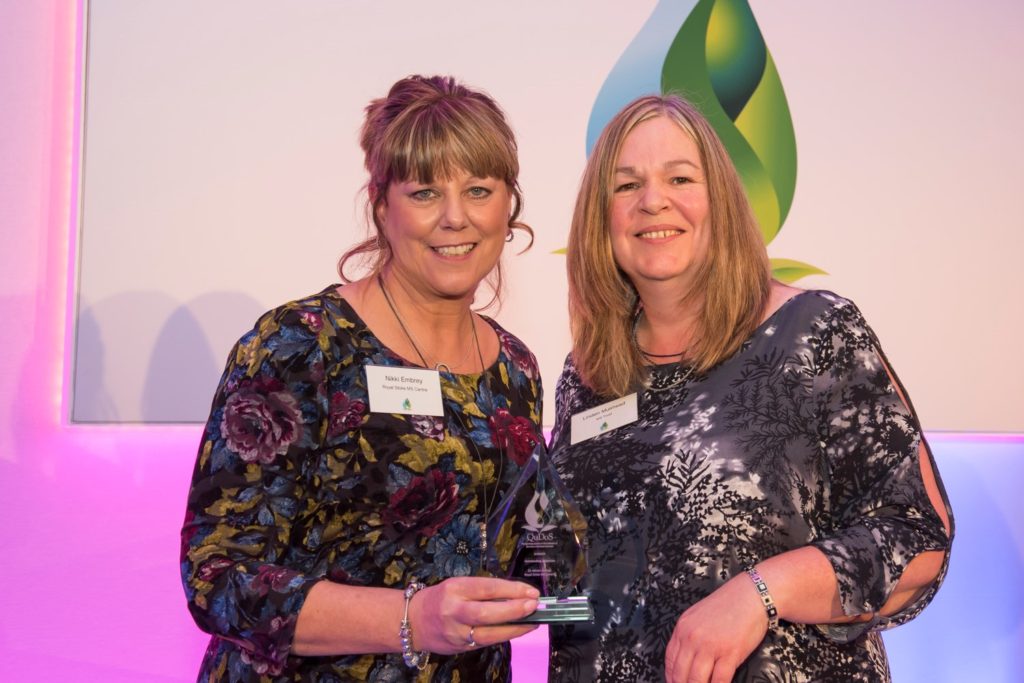
(From left to right: Nikki Embrey from the Royal Stoke MS Centre, accepting the award on behalf of Dr Al-Araji. It was presented to her by Linden Muirhead, Director of Information and Engagement, MS Trust)
The QuDoS recognition programme, organised by pharmaphorum and the Multiple Sclerosis Trust, recognised the best in care for the disease. In a series of articles profiling the winners, pharmaphorum speaks to Adnan Al-Araji, consultant neurologist, from the University Hospitals of North Midlands. After helping to create the Royal Stoke MS Centre of Excellence, Dr Al-Araji has won the Outstanding Physician in MS category.
Q: What did it mean to win the award?
A: Thank you to the MS Trust and the QuDoS team for recognising the work we have been doing at the Royal Stoke for people with MS. It is the fantastic team who deserves all the glory. Our team works by the mantra ”Excellence is not an accident,” and all our staff are committed to delivering the highest standard of care for our patients. The feedback we receive from patients is overwhelmingly positive and we use their comments to help shape our service and develop as professionals.
Q: Please could you tell me what inspired you to develop the service in the way that you did?
A: The Royal Stoke MS team believe that people with multiple sclerosis (pwMS) deserve a high-quality service. Learning from the team members’ international and regional experiences we promised ourselves we would develop a distinguished MS service. After extensive research and analysis, we reached the conclusion that the way forward would be to create a “Centre of Excellence” taking into consideration the challenges in the NHS. The team was successful in securing a business case to create the “Royal Stoke MS Centre of Excellence” in 2015.
Q: Please could you outline how the service works?
A: The Royal Stoke MS service cares for about 3000 pwMS in the North Midlands and surrounding areas. We developed a ‘hub and spoke’ model where most of the highly specialised work including treatments and infusions are done at the dedicated centre at the Royal Stoke University Hospital supported by eight satellite MS clinics in the community to deliver specialist services closer to home.
Early diagnosis is a priority through a fast-track “Neuroinflammation Clinic” for people suspected to have MS, and this is accessible for GPs as well as other general neurologists and healthcare professionals. This has resulted in significant reduction time from symptoms onset to diagnosis. We believe starting treatment with disease-modifying therapies early can make a difference to long-term prognosis; potentially eligible patients are assessed within four weeks.
The service has a holistic approach to managing and coordinating the needs of pwMS throughout the course of their condition, including support for advanced MS. We run a pioneered “MS Nurse on Call Service” to help patients and healthcare professionals with rapid access to specialised advice. We have also secured funds for technology enabled care services including a regional MS Facebook group supported by the MS Team.
Q: In their nomination form your colleagues say that you are a real team player. Why do you think this is important in MS services?
A: Creating a modern MS service is about complex team work. Gone is the time that an individual “hero” can deliver a satisfactory service. We all believe that a functioning and cooperative team is an absolute necessity. The team is proud to be “singing from the same hymn sheet”.
Q: How have you promoted multidisciplinary working?
A: I believe in working with the multidisciplinary team, enabling, supporting and sharing experiences with MS nurses and other members of the MS team. I am keen to adhere to national and local clinical guidelines. But I also like to consider the patient, rather than just treating the MS, and prefer an holistic approach, taking into consideration the patient and carer views, and considering preferences and circumstances. My approach is to always recognise that the final decision needs to be made by the patient.
I believe in developing good relationships with the whole of the multidisciplinary team and have worked on pathways to involve all the team, ensuring everyone’s views are heard, engaging with others and involving the entire dedicated MS team. I lead our weekly team meetings to discuss new ways of working and to consider interesting or difficult patient cases to enable learning and a considered approach.
Q: What feedback have you had from patients?
A: Patient evaluation for those attending treatments at the MS Centre showed that 90% rated the service as 10/10. 100% of surveyed patients felt welcomed and treated with respect and dignity at all times. One patient commented: “The whole service from nurses, and the infusions suite to the MS centre is always excellent. Everyone is kind, caring, supportive and understanding. I always have a very positive experience. Thank you! Thank you! Thank you!” One hundred per cent of patients in the regional MS Facebook group created by the team felt that it improved their knowledge of the condition.